Would a second Trump presidency make the US more or less attractive to foreign students?
- New global research from Intead and Studyportals finds that a large proportion of students considering the US as a study abroad destination don’t care which presidential nominee (Biden or Trump) wins the November 2024 US presidential election
- More favour a Biden presidency but a significant proportion would be more likely to want to study in the US under former president Trump
- Distaste for former president Trump has ebbed remarkably since the last round of research in 2016
A just-released global survey report from Intead and Studyportals, Know Your Neighbourhood, contains several surprising findings – including that a substantial segment of international students would be more likely to choose the US over other destinations if Donald Trump were to emerge the victor of the upcoming US election (5 November 2024) and become president for the second time.
The survey was conducted in March and April of 2024 and drew responses from almost 2,500 students in 106 countries. More than half (58%) were from Africa, 29% were from Asia, and 7% were from Europe; smaller numbers of students were from other regions. Most student respondents were interested in graduate (38%) or postgraduate programmes (37%) – especially programmes oriented in STEM subjects.
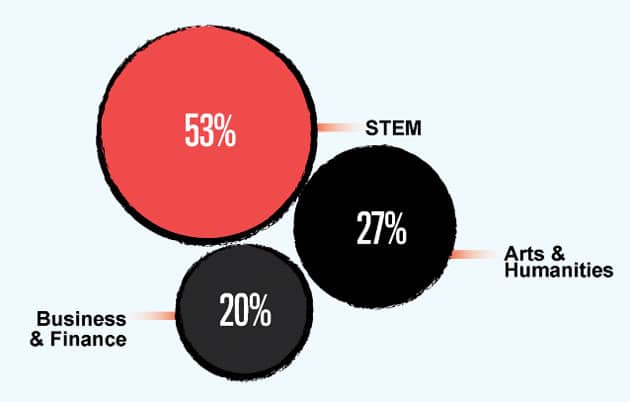
Career motivations a major driver, and many students want to take their skills back home
As usual, career motivations topped the list of reasons for why students were interested in study abroad, and a significant proportion of students were determined to bring skills acquired abroad home to their country. Learning English was also a common theme.
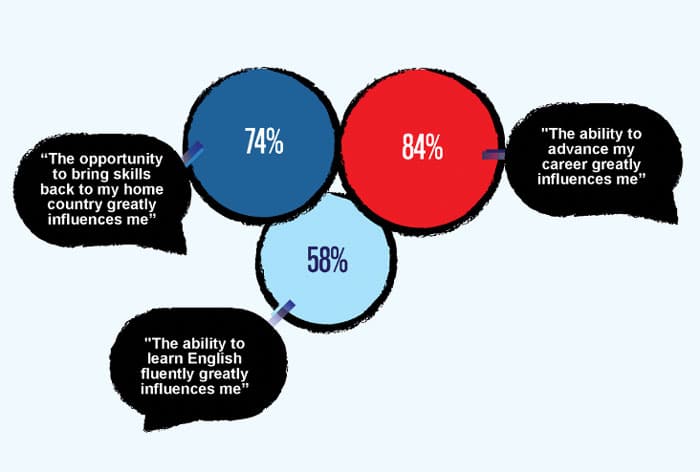
Almost half of students aren’t overly concerned about safety or discrimination
More than 4 in 10 students (44%) globally said they are not influenced by concerns about religious or racial discrimination, personal safety, or political instability when thinking about study abroad. This proportion rose significantly in Latin America, where three-quarters of respondents are unconcerned about discrimination or safety in a host country. More than 6 in 10 Latin Americans also said that safety issues in their own country are not a driver of their desire to study abroad.
Intead/Studyportals researchers offer this hypothesis for the relatively low concern about safety and security:
“Taking into account both of these prompts, these respondents’ generalized indifference may reflect the lifelong navigation of a complex, changeable socio-political environment of the countries’ citizens, which can foster greater desensitization to changeability or alleged lack of security anywhere.
While the percentage of respondents who cited ‘some’ to ‘a lot’ of influence remains high (66% collectively), the lack of reported concern about discrimination among nearly half of our respondents prompts us to reconsider the prevailing narratives surrounding international travel and how safety and acceptance actually impact these young adult travelers. While challenges of acceptance may exist, this substantial percentage of education-seekers are asserting their determination to pursue their academic goals regardless of their concerns about religious/racial discrimination, personal safety, and political instability.”
How would a potential Trump presidency affect the US’s appeal as a study destination?
Eight years ago, in the lead-up to the 2016 US presidential election, Intead/Studyportals ran a survey that found (1) a “significant distaste” for then-nominee Donald Trump and (2) a preference for nominee Hilary Clinton. As we know, Trump won that election and during his presidential term (2016–20), he was strikingly committed to ensuring that Chinese and Muslim students felt unwelcome in the US. In 2017, in fact, his administration barred students in six Muslim-majority countries from coming to the US to study.
Under Trump, a trend of declining international enrolments in the US accelerated, and foreign enrolments reached an all-time low in 2020/21. That trend began reversing under President Biden and the number of foreign students in the US reached a near-record high in 2022/23. Recent IDP research has found that the US is now the frontrunner in terms of most-preferred study abroad destinations as policy changes in Australia, Canada, and the UK have diminished those countries’ draw for international students.
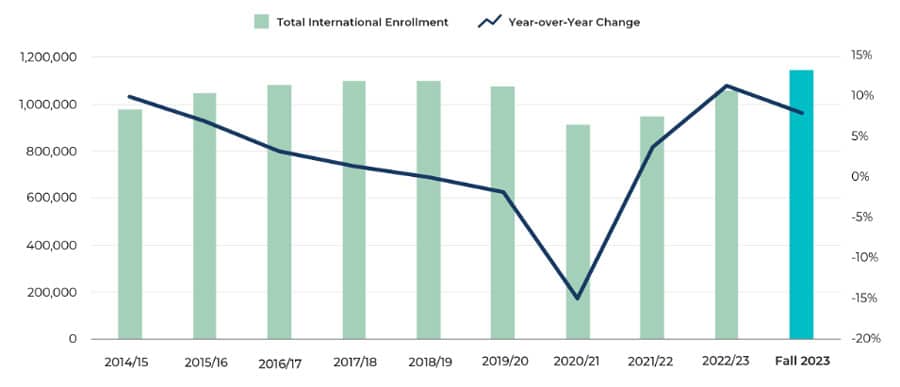
While campaigning for the 2024 election, Trump has promised that “the most aggressive vetting process in U.S. history” would ensure that only “the most skilled graduates who can make significant contributions to America” will be permitted to remain after they complete their programmes. Needless to say, more restrictive policies would affect the US's competitiveness in international student markets.
But Trump’s promises of heightened vigilance, and historically distrustful attitude towards immigrants and international students, do not seem to be deterring many prospective international students considering study in the US.
When asked in this year’s survey about their feelings about the upcoming November US election, 44% said that they would be more likely to study in the US if President Biden won – but a sizeable 30% said they would be more likely to do so if Donald Trump won. Moreover, 42% said it wouldn’t make a difference one way or the other which candidate emerged as the victor.
This means that nearly three-quarters of respondents would not be deterred from studying in the US in the event of a second Trump presidency – a far greater proportion than the 28% who said they would be less likely to study in the US should Trump win the November election.
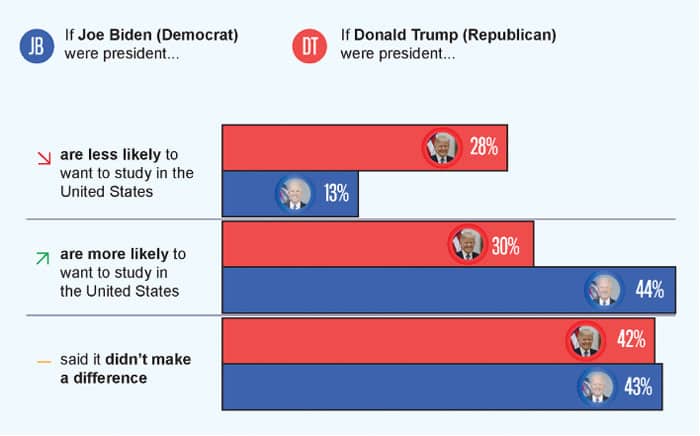
Respondents’ relatively mild reaction to a potential Trump victory is especially curious given that the bulk of survey participants came from Africa and Asia – the world regions with the largest number of Muslim-majority countries (and of course, China).
The Intead/Studyportals survey offered respondents an option to write in reasons for their feelings about each presidential nominee. In general, among those who favoured President Biden, the sense was that his presidency would mean “a more traditional diplomatic and international relations approach, potentially fostering a more welcoming environment for international students.”
As for the 30% who would be more likely to want to study in the US under a Trump presidency, written comments indicate that there is a sense that students envision better career prospects under Trump:
“Write-in responses indicate that the economic growth and job creation, along with policies promoting American businesses that may accompany the Republican’s leadership, could increase their career advancement and access to the US job market.”
It bears noting that the US’s gross domestic product (GDP) has increased by 8.4% (when adjusted for inflation) in the four years of President Biden’s administration, higher than the growth rate under former president Trump. But there is a longstanding notion in the US that Republicans (Trump’s party) prioritise the economy more than Democrats (Biden’s party) do, perhaps given Democrats’ more liberal and progressive orientation.
Intead/Studyportals researchers present this astute commentary:
“Additionally, our experience leads us to imagine that Mr. Trump's America-first rhetoric and policies may appeal to students interested in patriotic ideologies or those seeking a more insular cultural experience. Following our logic further, to these respondents a Trump presidency might also imply that the US will be less involved in foreign affairs, and less inclined to intervene in other countries' internal issues—a somewhat anti-imperial stance that could appeal to citizens of emerging/developing countries.”
A lot of students “just don’t care” about the result of the upcoming US election
Nearly half of surveyed students (42%) said that the political environment in the US does not make a difference to their motivation to study in the US. Intead/Studyportals researchers posit a number of theories about this finding, including the idea that the US political climate is such that students can hardly take the election seriously. Instead, they are simply focusing on the quality of US institutions and the desire for a good career.
Are students becoming desensitised to political volatility in the US (and elsewhere)?
The Know Your Neighbourhood report includes the following striking graphic. Keep in mind that in 2016, the attack on the US Capitol Building (6 January 2021) by a mob of pro-Trump supporters unwilling to accept President Biden’s electoral victory had not yet occurred. Nor had dozens of criminal charges and convictions against Trump yet proceeded through the courts. Still, student-respondents were twice as likely to say they would want to study in the US under Trump In 2024 as in 2016.
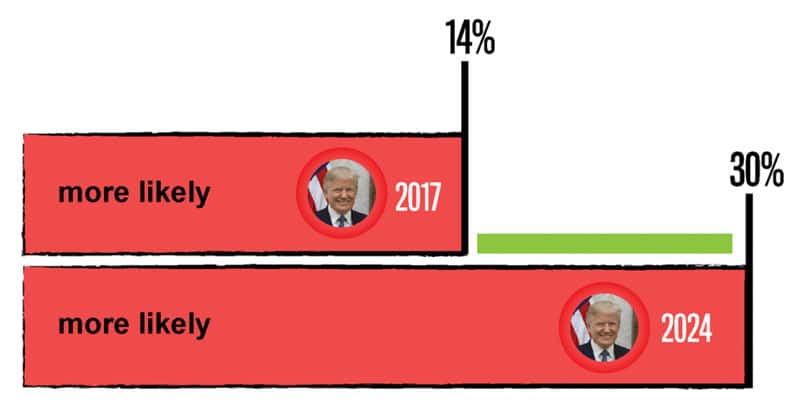
The significantly larger proportion indicating increased interest in 2024 under Trump is in many ways astounding, especially given how Trump has approached the issue of international students in the past. But perhaps the finding can be viewed in a context of increasing youth apathy and/or cynicism about politics and politicians in general, as young people watch their world increasingly gripped by extreme weather and devastating wars. As the US heads toward the November election:
- The Pew Research Centre has found that 3 in 10 people in 24 countries are in favour of authoritarian political systems – and this proportion rises in Asia and Africa. The poorer people are, the more likely they are to prefer authoritarian governments to democratically elected ones.
- China and Russia, both run by ever-more controlling authoritarian regimes, are becoming more powerful around the world, and democratic countries in close proximity are feeling the pressure.
- India's democratic conventions have been challenged under President Modi.
- Cuba, Nicaragua, and Venezuela are run by dictators.
- Türkiye's President Erdoğan and Hungary’s President Orbán routinely block EU legislation, and democratic traditions in Türkiye and Hungary have eroded in recent years under those leaders.
- Marine Le Pen’s far-right party is gaining ground in France.
- Only 12% of African countries are considered truly democratic.
Prospective students are living in an era where the idea of democracy is increasingly under pressure around the world. Amid this context, the idea that a US president who has promised to be “only a dictator on Day 1” may be sworn in on 5 November 2024 is not as shocking as it might once have been.
In the meantime, students still want to study in institutions that can give them the brightest future possible, and that overarching drive may be behind some of the more surprising findings of the Intead/Studyportals research.
For additional background, please see:
- “US international enrolment passed pre-pandemic levels for near record high in 2022/23”
- “US gains greater share of international student interest amid policy changes in competitor destinations”
- “New Biden presidency offers hope to international students and educators in the US”
- “US revokes over 1,000 Chinese students’ visas due to national security concerns”
















